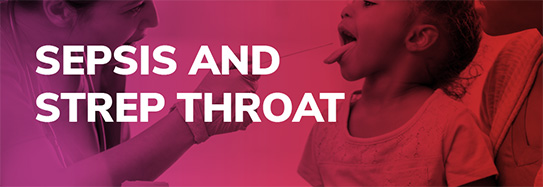Strep throat is a bacterial infection caused by Group A Streptococci. It’s most common in children and teens, but it can affect adults too. The infection is spread through droplets in the air, so if someone with the bacteria sneezes or coughs near you, you could become ill by breathing in the droplets. It can also be spread if the infected person has the bacteria on their hands, they touch something (such as a door knob), you touch the object, and then bring your hand to your nose or mouth.
Sepsis is a life-threatening emergency that happens when your body’s response to an infection damages vital organs and, often, causes death. Like strokes or heart attacks, sepsis is a medical emergency that requires rapid diagnosis and treatment.
Suggested Citation:
Sepsis Alliance. Sepsis and Strep Throat. 2024. https://www.sepsis.org/sepsisand/strep-throat/
Updated June 18, 2024.






































